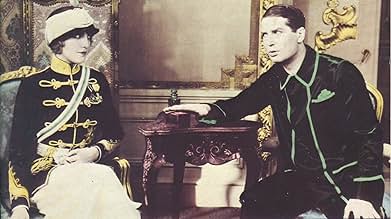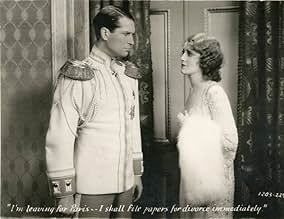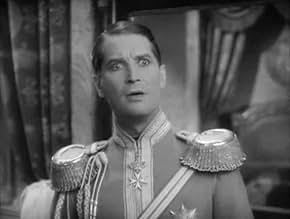AVALIAÇÃO DA IMDb
7,0/10
2,7 mil
SUA AVALIAÇÃO
O gabinete da rainha está tenso com a possibilidade de ela ficar solteirona. Relaxa quando ela se casa com um rude conde. Ele, não satisfeito como consorte, quando não tem respeitadas suas o... Ler tudoO gabinete da rainha está tenso com a possibilidade de ela ficar solteirona. Relaxa quando ela se casa com um rude conde. Ele, não satisfeito como consorte, quando não tem respeitadas suas ordens, cria dificuldades no casamento.O gabinete da rainha está tenso com a possibilidade de ela ficar solteirona. Relaxa quando ela se casa com um rude conde. Ele, não satisfeito como consorte, quando não tem respeitadas suas ordens, cria dificuldades no casamento.
- Indicado a 6 Oscars
- 4 vitórias e 6 indicações no total
Carl Stockdale
- The Admiral
- (as Carlton Stockdale)
Albert De Winton
- Cabinet Minister
- (as Albert de Winton)
Enredo
Você sabia?
- CuriosidadesConsidered by many to be the first musical film in which the songs were integrated with the story.
- Erros de gravaçãoThe fact that Count Alfred (Maurice Chevalier) speaks with a French accent, even though he is not supposed to be French, is really not an "error". However, by adding a scene to attempt to explain this anomaly, it only serves to highlight the accent discrepancies in the casting. For instance, in contrast to the accent discrepancy with Chevalier's character, no one seems to notice that his French servant, Jacques (Lupino Lane), speaks British English with no discernible French accent.
- Citações
Queen Louise: Why am I always awakened from my dreams?
- Versões alternativasThere is an Italian edition of this film on DVD, distributed by DNA Srl: "IL PRINCIPE CONSORTE (1929) + AMAMI STANOTTE (1932)" (2 Films on a single DVD), re-edited with the contribution of film historian Riccardo Cusin. This version is also available for streaming on some platforms.
- ConexõesFeatured in The Love Goddesses (1965)
Avaliação em destaque
Poor Queen Louise when she is awakened by her attendants she has been dreaming of love but must face another day in the Kingdom of Sylvania without a husband. When an errant military adjutant is recalled from Paris to face her censure she falls for his charms and he for hers, and they marry. But the Queen's new husband is unhappy in the role of obedient consort. Conflict arises but is eventually resolved, as we know it will be in operetta land.
This early Lubitsch musical rates about the same as MONTE CARLO made a year later. The highlight here is the performance of Maurice Chevalier as the consort, a sort of pre-Cary Grant Cary Grant, Gallic style. He has the same effortless magnetism and charm and a certain physical resemblance. Jeanette MacDonald is as good here as in MONTE CARLO, handling songs and dialogue with equal aplomb and looking gorgeous in her filmy gowns. As is usual with Lubitsch, there is a superior supporting cast, here including the formidable Lupino Lane as Chevalier's valet, a sassy and brassy Lillian Roth as Lane's love interest and Edgar Norton as the "Master of Ceremonies," the personification of royal lackey. Another Lubitsch hallmark, the measured depiction of ritualistic daily activities, gets much display in the context of the protocols of a royal palace. The songs by Victor Schertzinger and Clifford Grey are only passable and the primitive sound recording doesn't help in getting them across but the tone of the whole enterprise is so frothy and pleasant that one doesn't mind not hearing all of the lyrics.
When you compare this film to other musicals from the dawn of the sound era like Broadway MELODY the difference is glaring. Lubitsch's camera is liberated and fluid and we get an assortment of physical approaches to song and dance numbers which themselves vary in style from pompous operetta-military to musical hall slapstick to Gilbert-and- Sullivanesque call-and-repeat choral to intimate romantic duets. There is a hint of LOVE ME TONIGHT in some of the ensemble work, particularly with the palace staff. And the script is studded with witty observations and clever comic constructions, some via dialogue, some through pure visuals. THE LOVE PARADE illustrates that in 1929 Rouben Mamoulian (APPLAUSE) was not alone among film directors in recognizing the value of sound as an artistic element and in refusing to subordinate the freedom of the camera to the dictates of miking.
This early Lubitsch musical rates about the same as MONTE CARLO made a year later. The highlight here is the performance of Maurice Chevalier as the consort, a sort of pre-Cary Grant Cary Grant, Gallic style. He has the same effortless magnetism and charm and a certain physical resemblance. Jeanette MacDonald is as good here as in MONTE CARLO, handling songs and dialogue with equal aplomb and looking gorgeous in her filmy gowns. As is usual with Lubitsch, there is a superior supporting cast, here including the formidable Lupino Lane as Chevalier's valet, a sassy and brassy Lillian Roth as Lane's love interest and Edgar Norton as the "Master of Ceremonies," the personification of royal lackey. Another Lubitsch hallmark, the measured depiction of ritualistic daily activities, gets much display in the context of the protocols of a royal palace. The songs by Victor Schertzinger and Clifford Grey are only passable and the primitive sound recording doesn't help in getting them across but the tone of the whole enterprise is so frothy and pleasant that one doesn't mind not hearing all of the lyrics.
When you compare this film to other musicals from the dawn of the sound era like Broadway MELODY the difference is glaring. Lubitsch's camera is liberated and fluid and we get an assortment of physical approaches to song and dance numbers which themselves vary in style from pompous operetta-military to musical hall slapstick to Gilbert-and- Sullivanesque call-and-repeat choral to intimate romantic duets. There is a hint of LOVE ME TONIGHT in some of the ensemble work, particularly with the palace staff. And the script is studded with witty observations and clever comic constructions, some via dialogue, some through pure visuals. THE LOVE PARADE illustrates that in 1929 Rouben Mamoulian (APPLAUSE) was not alone among film directors in recognizing the value of sound as an artistic element and in refusing to subordinate the freedom of the camera to the dictates of miking.
- mukava991
- 24 de jul. de 2008
- Link permanente
Principais escolhas
Faça login para avaliar e ver a lista de recomendações personalizadas
- How long is The Love Parade?Fornecido pela Alexa
Detalhes
- Data de lançamento
- País de origem
- Idiomas
- Também conhecido como
- The Love Parade
- Locações de filme
- Empresa de produção
- Consulte mais créditos da empresa na IMDbPro
Bilheteria
- Orçamento
- US$ 650.000 (estimativa)
- Tempo de duração1 hora 47 minutos
- Cor
Contribua para esta página
Sugerir uma alteração ou adicionar conteúdo ausente



































